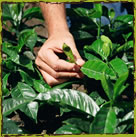UPDATE: All the News that Fits!
Welcome to the wide world of coffee from a woman’s perspective! Here is where you’ll find all kinds of news regarding the involvement of women in all aspects of coffee. From socially conscious, charitable doctors who care about the quality of their fellow women and children’s lives in coffee growing countries—to women brave enough to break into the traditional male domain of ownership, production and delivery of the roasted bean—to the impact that current coffee news has on our day-to-day lives—here is where to come for the latest updates.
REPORT FROM THE FIELD
Weaving Dreams…
Dateline: Cauca, Colombia…
Off the dusty, hot beaten path of town, behind a coffee co-op, down a dirt road, lies the office of a unique women’s commercial enterprise. Here, the shelves are stacked with a riot of colorful shawls, scarves, capes, ponchos and other woven accessories. The computers are humming along but the copier is on the blink (sound familiar?). But the story behind this oasis of color and beauty is clearly seen in the luminous weavings of this concern… A group of women, whose families eke out a living in the coffee fields of the region, got together to figure out a way to supplement their income. They came up with an ingenious idea (involving silk worms from China and mind bending natural dyes) and named it Yu’USXA…
When the native people of Cauca, in Southern Colombia, tell the story of their origins, they tell the tale of Yu’USXA, a goddess born from the waters, who taught them the art of weaving. Even today, weaving is the first art that indigenous women are expected to learn. When they spin and weave, they are weaving their past lives and their future dreams.
The expert hands of dozens of rural families are involved in this labor. From transforming the silkworm cocoons into threads, to degumming and twisting these threads, to the dying and weaving processes, all the family members participate. This activity involves and integrates the families of this region. Small or big hands, soft or sun-roughened, the loving, hand-made quality of each piece shines through.
This weaving incorporates oriental methods of rearing silkworms that munch away on mulberry bushes planted around the areas’ many coffee farms, producing silk thread. (Chinese, Japanese and Korean masters brought these techniques to Colombia years before and combined them with the native women of Cauca’s innate, ancestral weaving skills.) The resulting colors and textures represent a melding of traditional textile arts and resources of two hemispheres.
The colors of the woven pieces, sometimes subtle but often shockingly vibrant, come from natural dyes that are extracted from beans, leaves, seeds, fruits, tree barks, and flower, as well as from man-made dyes. There are knots and irregularities throughout a lot of the weavings, adding charm and authenticity that just can’t be reproduced by machine. And, each piece comes with its on proof of origin on the tag: the name of the weaver, the name of the small association she belongs to, the name of her town, the harvest date of the cocoons and the type of dye that was used.
NOTE:
Here is their unedited corporate statement…
“Silk growing is a production chain, which includes cultivating mulberry bushes, growing silk worms, production and transformation of the cocoons into thread and woven goods for eventual commercialization. The Corporation for the Development of Sericulture in Cauca - CORSEDA is a grade two organization made up of local associations of silk producers and artisans (6 associations) in the state of Cauca (municipalities of Popayan, Timbio, El Tambo, Piendamo, Morales and Santander de Quilichao). Through this organization we hope to build a social fabric basically through bettering our negotiating capacity, and unifying parameters of production, but above all by giving sericulture families coverage in terms of social welfare.”
Check out these unusual artisanal weavings on their beautiful website: www.corseda.com.


